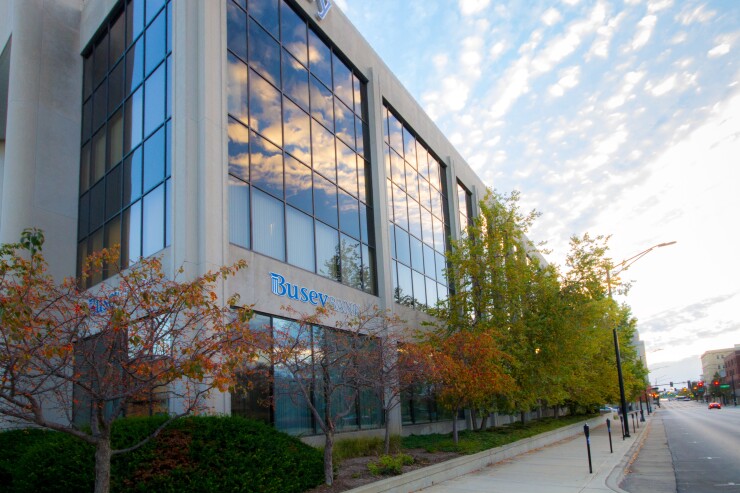
The deal, slated to close in the first half of 2025, would merge the
The merged company would have
"We believe the two companies complement each other incredibly well. What Busey brings to CrossFirst is a robust capital foundation, a leading core deposit base and integrated wealth management and payments platforms, and a high level of historical credit discipline and quality," First Busey Chairman and CEO Van Dukeman said during a conference call Tuesday after announcing the deal.
"Those of you that that I have spoken to often know we are laser-focused on improving our company's loan yields with high-quality growth. This is one of the many strings that CrossFirst provides," he said, asserting that the deal "helps drive us forward with that initiative while maintaining a well-diversified portfolio."
Additionally, he added, "the markets they operate in and their lending expertise are expected to provide tremendous opportunities for us to continue putting on high-quality loan growth backed by our strong balance sheet. And we are going to be able to achieve all of this by agreeing to a deal with very attractive pro forma financial economics and without materially diluting our existing shareholders."
The combination would expand First Busey's footprint to Arizona, Colorado, Kansas, New Mexico, Oklahoma and Texas. The buyer said the deal would give it entrance to the "high-growth" markets of Kansas City, Dallas-Fort Worth, Denver, Phoenix and Wichita, Kansas.
CrossFirst has generated robust loan growth in the 6% to 8% range, executives said. This should help boost First Busey's growth rate from around 3% to 4% up to as much as 6%, they said on the call.
Upon closing of the deal, First Busey's shareholders would own approximately 63.5% of the combined company; CrossFirst's investors would own the rest. It would continue to operate under the First Busey name and continue to trade on the Nasdaq under the "BUSE" symbol.
The combined company's board would consist of eight directors from First Busey and five from CrossFirst, with Dukeman serving as executive chairman and CEO. CrossFirst President and CEO Mike Maddox would become president and executive vice chairman.
Maddox would be in line to succeed Dukeman as CEO about a year after the deal closes, the companies said. Dukeman intends to remain executive chairman indefinitely.
"We firmly believe our strong market demographics, commercial focus, and growth potential will help elevate the combined company to a leading regional banking institution throughout the Midwest and Southwestern regions of the United States," Maddox said on the call.
"Our markets are dynamic, and we continue to see high-quality loan growth across our footprint," he added. "They include some of the most economically vibrant metropolitan areas in the United States."
Both First Busey and CrossFirst have been
Excluding one-time merger charges and assuming expected cost savings, First Busey estimated the acquisition would result in earnings per share accretion of approximately 20% in 2026, the first full year of combined operations. First Busey expects cost savings to equal 16% of the target's operating expenses.
Tangible book value per share dilution was projected to be 0.6% with a forecasted earn-back period of six months.
Analyst Brian Martin of Janney Montgomery Scott said "the pricing seems fair" for CrossFirst. With a price-to-earnings ratio of 11.4 times, he said, it is in line with comparatively sized deals this year.
First Busey said its bank unit would remain based in Champaign, but the holding company headquarters would move to Leawood — at the site of the current CrossFirst headquarters in the Kansas City area — because that will be a central location for the combined bank.
Following a slow year in 2023, when only 100 M&A deals were announced in the banking sector, more than 70 banks have announced plans to sell this year. That puts 2024 on pace to easily exceed last year's total.
Broadly on the M&A front, increased regulatory scrutiny discouraged some deal discussions over the past couple years. Several deals were delayed and others were nixed. Some acquisitive banks were reluctant to commit to a deal that might get mired in a protracted, expensive review process.
In addition, high interest rates galvanized concerns about a recession and curbed some buyers' appetites. Economic downturns often hinder borrowers' ability to repay loans, causing higher credit losses for banks. This includes possible sellers.
But the economy proved resilient this year and the Federal Reserve has indicated it is poised to begin
Already, in addition to more transactions, deals are much larger this year.
Through July of this year, bank M&A transactions had an aggregate deal value of $9.25 billion, far surpassing the $4.15 billion for all of last year, according to S&P Global Market Intelligence.
Ernst & Young said in a mid-year M&A assessment that deals are getting larger across banking and all sectors.
"M&A activity should remain resilient, mainly due to large deals driven by well-capitalized firms looking to strengthen their market positions and capitalize on favorable acquisition terms," EY analyst Mitch Berlin said.
By deal value, the First Busey-CrossFirst tie-up is the fifth-largest announced to date this year.
"We had a lot of proactive conversations with our regulators, keeping them informed throughout the process," Dukeman said. "We have a great relationship with our regulators and through continuing open dialogue, we will seek to work collaboratively to ensure they have a strong level of comfort with this merger."
The biggest deal announced this year was Winter Haven, Florida-based
That was followed closely by Kansas City-based UMB Financial's April plan to purchase Heartland Financial USA in Denver in an all-stock transaction valued at just under $2 billion.





